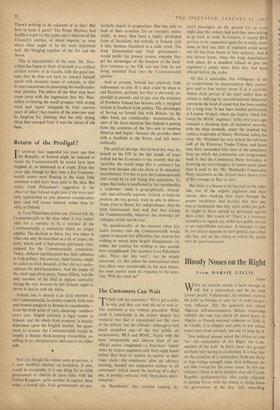Return of the Prodigal?
TF anybody had suggested ten years ago that _lithe Republic of Ireland might be induced to rejoin the Commonwealth he would have been laughed at, or dismissed as a crank. Even five years ago, though by that time a few Common- wealth straws were floating in the wind, little attention would have been paid to the idea. But today, Lord Pakenham's suggestion in the Observer that Ireland might join if she were tact- fully approached to join deserves consideration here—and will arouse interest, rather than in- sults, in Ireland.
As Lord Pakenham points out, Ireland left the Commonwealth at the time when it was impos- sible for a republic to be a member of the Commonwealth, a restriction which no longer applies. The decision to leave, too, was taken in what can only be described as a fit of pique; the party which took it had always previously cam- paigned for the Commonwealth connection. Today, diehard republicanism has little influence in Irish politics. The premier, Sean Lemass, might be called an Irish Butskell, if that did not under- estimate his hard-headcdness. And the leader of the chief opposition party, James Dillon, was the only member of the Dail to oppose neutrality during the war, because he felt Ireland ought to throw in her lot with the Allies.
• Ireland, too, is already a de facto member of the Commonwealth, in certain respects. Irish men and women emigrate to Britain in considerable— from the Irish point of view, alarming—numbers every year. Engish currency is legal tender in Ireland, and the whole Irish economy is heavily dependent upon the English market. An agree- ment to re-enter the Commonwealth would be largely a Statute Book-keeping transaction, re- sulting in no administrative dislocation on either side.
And yet, though the omens seem propitious, it is now doubtful whether an invitation, if sent, would be acceptable. It is one thing for an Irish government to cherish de facto links with the United Kingdom, quite another to register them under a formal title. Irish governments are par- ar-
ticularly expert in pragmatism. One has only to look at their economy for an example; indus- trially, at least, they have a highly developed form of Socialism, but nobody in Ireland calls it that, because Socialism is a rude word. The Irish Government—any Irish government— would prefer the present system, whereby they get the advantages of the freedom of the back- door entrance to the UK and lose little by not being admitted back into the Commonwealth parlour.
And at present, Ireland has relatively little inducement to join. If a deal could be done to end Partition, perhaps; but that is obviously im- possible at present, and in any case the existence of Northern Ireland has become only a marginal irritant in Southern Irish politics. The advantages of having no formal link with Britain, on the other hand, are considerable: economically, in view of the keen attention that Ireland is getting from the countries of the Six—not to mention America and Japan—because she provides them with a foothold in the Seven; and still more, politically.
The political prestige that Ireland has won for herself at the UN in the last couple of years (which led the Economist to say recently that she 'bestrides the world stage like a colossus') has been won because she can claim to be detached, uncommitted. For her to join the Commonwealth club would be to risk losing that reputation. To argue that India is unaffected by her membership is irrelevant: India is geographically, strategi- cally and culturally separate. Ireland, to hold the position she has gained, must be able to demon- strate, even to flaunt, her independence. And the Irish Government may well feel that joining the Commonwealth, whatever the domestic ad- vantages, would not be wise.
So, paradoxically, at the moment when Ire- land's re-entry into the Commonwealth would appear to present few difficulties, her motives for wishing to return have largely disappeared—or, rather, her motives for wishing to stay outside have strengthened. The question Lord Pakenham asks, 'Must she stay out?', can be simply answered: no. But unless the international situa- tion alters very considerably in the near future, the same answer must be expected to the ques- tion, Will she come in?'


































 Previous page
Previous page